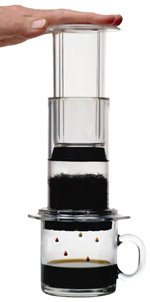Empiricism is king!
 I love the farmers' markets, but I have a few other passions, among them coffee, wine, and chocolate. Part of what I love about the markets as a consumer is that I can ultimately come to discern and enjoy the unique product of specific agricultural practices and the differences of specific varieties.
I love the farmers' markets, but I have a few other passions, among them coffee, wine, and chocolate. Part of what I love about the markets as a consumer is that I can ultimately come to discern and enjoy the unique product of specific agricultural practices and the differences of specific varieties.For example, I was blown away when I tried the oranges from Olsen Organics. He dry farms his citrus biodynamically, which I do not yet fully understand. What I can tell you is that I have never had a better orange; it was so intense, so sweet. The pork from Prather Ranch comes from heirloom breeds that are range-raised. This pork is not the "other white meat". It is juicy and gloriously marbled. We made some whooping thick loin chops last night and I had to step away from them for a while. As a result, they cooked longer than I would have wanted, but did they taste overcooked, were they dry or stiff? No, they were delicious. This is what pork was meant to taste like before pork producers tried to get on the chicken bandwagon.
Similarly, with chocolate and wine, one can discern the unique elements of its' production. In the wine world, the unique flavor aspect that conveys something about the location of vineyard is called 'terrior' (pronounced 'tare-wahr'). From many bittersweet chocolate tastings of various varietals and producers, one could say chocolate has its terrior, too. Coffee has its terrior, but unlike wine and chocolate, coffee must be made properly. In addition to the quality of the beans and the roast, the technique used to prepare coffee makes a world of difference.
But how would I know what is better or which technique really worked. This is where empiricism comes in. Empiricism is a theory of knowledge based primarily on first-hand experience. So let's do some taste tests. Now I started with the tests done for the magazine Cook's Illustrated. In their evaluation, two methods of making coffee stand out producing outstanding coffee -- the vacuum coffee maker and the manual (paper filter) drip. The vacuum coffee maker is a curious glass contraption that requires significant clean-up and is obviously quite delicate. A manual drip involves a cheap plastic cone and a paper filter. It is preferable to have a carafe to make the coffee into to retain temperature, but I always drink the coffee immediately so do not use one. Based on the cost and inconvenience I have stuck with the time-tested manual drip method, until recently.

In searching for an alternative manner of producing espresso without buying a several thousand dollar machine to produce a beverage close to the espresso found in French cafes, I came across the AeroPress. This is an unlikely device. First off, it was created by a guy who made this. Secondly, it looks weird.
I have had the AeroPress for about two months and initially I was impressed. Then I tried it with the best light to medium roast beans I could get a Trader Joe's. The coffee sucked. At first, I thought the AeroPress was to blame and tested it against the manual drip. This was pretty bad, too. Clearly, these were inferior beans, in spite being the best TJ's had to offer. So I got some good beans and, sure enough, I returned to getting excellent results with the AeroPress. More confident at this point, this morning I tested the AeroPress head-to-head with the manual drip. I used the same beans, the same grind, the same water (with a slight increase in water temperature for the manual drip). The AeroPress coffee was tasted straight and then with an addition of hot water. It was more full-bodied than the manual drip with less bitterness. In spite of the marketing of the AeroPress it does not really produce espresso, but it is exceptionally good strong coffee that can be enjoyed concentrated or diluted with hot water (my preference). While it is a little more labor intensive than the manual drip, it is also much faster. I am generally not a big fan of gadgets, as they are often not helpful. But this one I am definitely enjoying and for $28 it is a steal. I usually drink coffee only the weekends, when I have the time to make and enjoy it. Recently, I have been saving a few minutes in the morning to grind some fresh beans and run the AeroPress before heading out the door.



1 Comments:
Hey Alex,
Nice blog. The ristretto shots from the Krups might be worth a shot as well. Foamy & sweet the way espresso is supposed to be. I'm off coffee right now until the body heals up. But try the short shots, that might be cool and affordable weekend option for you too.
Francesca
http://tribes.tribe.net/sexyfood
Post a Comment
<< Home